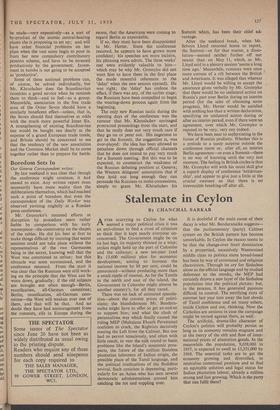Boredom Sets In
Our Geneva Correspondent writes:
By last weekend it was clear that though the conference might continue, it had ceased to exist. Any written report must necessarily have more reality than the deliberations themselves, which had reached such a point of boredom that even the correspondent of the Daily Worker was observed yawning mightily at a Russian press conference.
Mr. Gromyko's resumed efforts at disruption by procedure seem rather feeble by comparison with his early masterpiece—the controversy on the shapes of the tables. He did his best at first to make things difficult by insisting that secret sessions could not take place without the representatives of the two Germanies being in the secret, knowing well that the West was committed to refuse; but this obstacle was soon surmounted, and the conference resumed. From the start it was clear that the Russians were still work- ing on the principle that the West can be worn down, gradually; if the old subjects are brought out often enough—Berlin, reunification, all-German committee; Berlin, reunification, all-German com- mittee—the West will weaken over one of them, and that will be that. And no doubt they have had encouragement from the rumours, rife in Europe during the recess, that the Americans were coming to regard Berlin as expendable.
If so, they must have been disappointed in Mr. Herter. Since the conference resumed, he appears to have grown more confident; his speeches are more incisive, his phrasing more adroit. The three weeks' rest were evidently valuable to him— which may be why Mr. Gromyko did not want him to have them in the first place (he made resentful references to the 'delay' when the new session opened). He was right; the 'delay' has undone the effect, if there was any, of the earlier stage; the Russians have been compelled to begin the wearing-down process again from the beginning.
The only new Russian tactic during the opening days of the conference was the rumour that Mr. Khrushchev envisaged protracted proceedings from the start, and that he really does not very much care if they go on or peter out. His eagerness to get to the Summit, the suggestion is, was over-played: the idea has been allowed to percolate down through official channels that he does not intend to pay very much for a Summit meeting. But this was to be expected, to counteract the weakness of the Russian debating position at Geneva; the Western delegates' assumption that if they hold out long enough they can persuade the Russians to make concessions, simply to grant Mr. Khrushchev his Summit whim, has been their chief ad- vantage.
After the weekend break, when Mr. Selwyn Lloyd returned home to report, the Summit—or for that matter, a disso- lution—seemed neither further off nor nearer than on May 11, which, as Mr. Lloyd said in a plenary session 'seems a long time ago.' Meanwhile, rumours were once more current of a rift between the British and Americans. It was alleged that whereas Mr. Lloyd would be willing to accept the assurance given verbally by Mr. Gromyko that there would be no unilateral action on Russia's part over Berlin during an interim period (for the sake of obtaining some progress), Mr. Herter would be satisfied with nothing less than a written declaration, specifying no unilateral action during or after an interim period, even if there were no agreement, over which Mr. Gromyko is reputed to be very, very coy indeed.
We have been near to asphyxiating in the fumes of Russian prolixity. Whether this is a prelude to a nasty surprise outside the conference room or, after all, an interim Berlin agreement—or even a Summit—there is no way of knowing until the very last moment. Tho feeling in British circles is that Mr. Gromyko will with his usual skill give a superb display of conference 'brinkman- ship', and appear to give just a little at the crucial moment so that there is no irrevocable breaking-off after all.






























 Previous page
Previous page